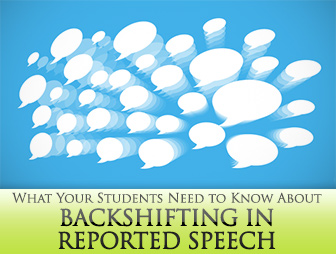If you have been teaching ESL for any length of time, you have probably tried your hand at explaining reported speech.
As native speakers, we don’t talk about reported speech very often. Our mental grammar clearly knows the difference between quoted speech and speech that does not use the direct words of the speakers. For English language learners however, an explanation of what reported speech is and how to use it is necessary. Of particular importance is the shift in verb tense we see in reported speech. Here is what your students should know about it.

What Your Students Need to Know About Backshifting in Reported Speech
When a speaker changes direct speech to reported speech, he or she will see that many changes take place. These changes can include modifications to pronouns, time adverbials, and most often, verb tense. It is this change in verb tense which is referred to as ‘backshifting’. Backshifting happens when a verb tense is shifted back to a past form in reported speech. Though backshifting doesn’t happen in all reported speech, it does happen often.
-
1
Present Tenses
Present tenses backshift to past tenses in reported speech.
“I am feeling sick.” She said she was feeling sick. “Are you sick?” He asked if she was sick. -
2
Perfect Tenses
Quoted speech in the present perfect become reported speech in the past perfect; present perfect progressive become past perfect progressive.
“I have taken that class.” You said you had taken that class. “He has been studying for hours.” They said that he had been studying for hours. -
3
Past Tenses
Verbs in the past tenses backshift to the past perfect, past progressive to past perfect progressive.
“Where did you hear that?” She asked where I had heard that. “I was talking about Tammy.” She said she had been talking about Tammy. -
4
Modal Verbs
Can, may and will change to could, might and would.
“Can I come?” He asked if he could come. “They may like it.” I thought they might like it. “Will you be free?” You asked if I would be free. Other modals do not change in reported speech. These include could, might, would, should and needn’t.
-
5
No Backshifting
Some English tenses do not backshift in reported speech. These depend on the tense of the main verb in the reported speech. When the main verb in the reported speech is in the present tense, the verb in the reported phrase does not change. This is true no matter what tense is used in the quoted speech.
“He is coming.” She says that he is coming. “They were here.” He says that they were here. “I am having trouble.” You admit that you are having trouble. “They came yesterday.” He says they came yesterday. “I can do it.” She says she can do it. -
6
Optional Backshifting
Sometimes, backshifting is optional in reported speech. When the speaker articulating the reported speech uses the past tense in the main verb but the situation in the direct speech is still true, backshifting is optional. This is true when the reported verb is in the simple past, past progressive or past perfect.
“I want an answer.” She said that she wants an answer. She said that she wanted an answer. “He is thinking about it.” They said that he is thinking about it. They said that he was thinking about it. “We have made arrangements.” You said they have made arrangements. You said they had made arrangements. If the situation in the direct speech is no longer true when the speech is reported, backshifting is obligatory.
“I want a puppy.” She said she wanted a puppy (but changed her mind). “He is wearing socks.” They said that he was wearing socks (but he’s not now). “She has been enjoying class.” He said she had been enjoying class (but she isn’t now).
Practice Makes Perfect
The best way for your students to get backshifting patterns of reported speech into their own speech is to give them plenty of practice. A simple interview is just enough to create a situation for reported speech. Have pairs of students interview each other during class. Make sure students ask questions that will elicit a variety of tenses in their responses. Once the interviews are finished, have each student tell the rest of the class what his or her partner said. She should change her partner’s direct quotations into reported speech. Correct any errors during the presentations.
There are many other activities you can use to practice reported speech with your students. What are some you love to use in class?
P.S. If you enjoyed this article, please help spread it by clicking one of those sharing buttons below. And if you are interested in more, you should follow our Facebook page where we share more about creative, non-boring ways to teach English.







